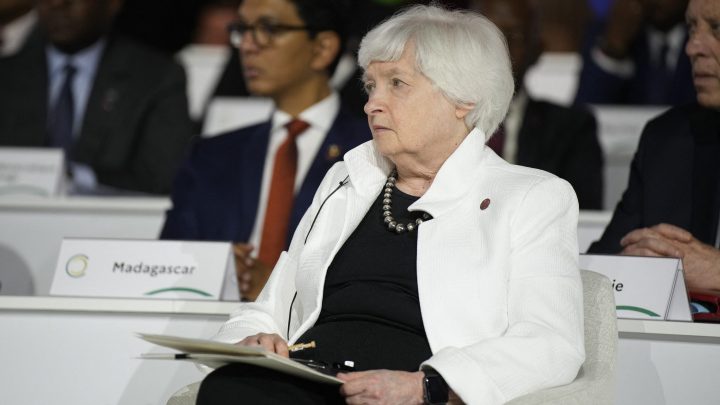
Yellen’s trip to China may start with finding economic common ground
Yellen’s trip to China may start with finding economic common ground

Treasury Secretary Janet Yellen said in April that she wanted to travel to China. She also told “Marketplace” that she wanted to help set a “floor” under the relationship between the world’s two largest economies.
Now Bloomberg has reported that Yellen plans to take a trip to Beijing in July. If a floor under the relationship is the goal, the Treasury chief will have her work cut out for her.
Many of the problems in the United States-China relationship are economic. For the U.S., it comes down to the structure of China’s economy, said Joshua Meltzer, a senior fellow at the Brookings Institution.
“Particularly the heavy role of the state in subsidizing industries and providing other kinds of preferential support,” Meltzer said.
Add relentless industrial espionage and technology transfer, and that’s just the short list. China has its own economic complaints, as the U.S. has gone after Chinese tech giants like Huawei and ZTE and banned the export of certain computer chips.
“It’s a view that the U.S. is suppressing its economic rise by preventing it getting access to technologies,” Meltzer said.
Part of the Joe Biden administration’s proposed strategy for managing the relationship is to compartmentalize the worst parts of it.
“Which means the U.S. is going to have narrowly targeted sanctions on important goods and/or services,” said Edward Alden, senior fellow at the Council on Foreign Relations.
The administration wants to limit the flow of U.S. money and technology to China in regard to sensitive or military-related areas. “You know, small yard and high fences,” Alden added.
But from China’s perspective, there’s a lot in that yard.
“In China’s eyes, that essentially puts much of the foundation for much of the modern economy into that yard,” said Martin Chorzempa, a senior fellow at the Peterson Institute for International Economics.
These differences have been intractable so far with relations between the U.S. and China going south.
“Not talking isn’t going to solve those issues either,” said Jessica Chen Weiss, professor of government at Cornell.
She pointed out that both countries understand they need each other economically.
“Some degree of economic integration is beneficial to the companies on both sides and overall prosperity of both peoples,” Weiss said.
They share certain global concerns too — like inflation and general economic stability. All of that could help build the floor under the relationship that Yellen would like to see.
There’s a lot happening in the world. Through it all, Marketplace is here for you.
You rely on Marketplace to break down the world’s events and tell you how it affects you in a fact-based, approachable way. We rely on your financial support to keep making that possible.
Your donation today powers the independent journalism that you rely on. For just $5/month, you can help sustain Marketplace so we can keep reporting on the things that matter to you.











